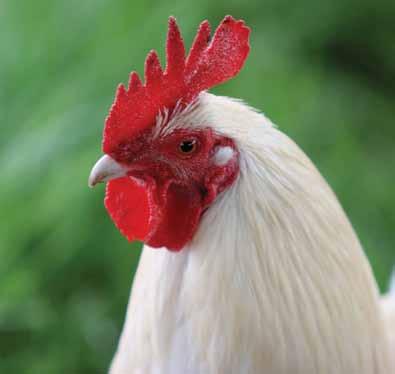
3 minute read
to assist in disease control of the flock, continue biosecurity efforts
By david B. strickland poultry times editor dstrickland@poultrytimes.com
GAINESVILLE, Ga. — A very effective tool to assist in keeping birds healthy from disease is biosecurity. Poultry Times has been presenting a deep dive into biosecurity and its various focus areas. One of these areas is keeping an eye out for unusual mortalities.
Advertisement
USDA’s Animal and Plant Health Inspection Service notes that some bird mortality in a flock is to be expected, but large percentages is not normal. APHIS notes to rule out any obvious causes such as weather issues, predators or external factors. These types of deaths do not need to be reported, but if the culprit is from disease, these need to be reported because this will help to keep other farms in the area safe.
Signs of illness
APHIS provides a list of symptoms that should be noted when determining if an illness is affecting a flock.
These include:
• Swelling of eyelids, comb, head, wattles and shanks
• Reduced appetite, reduced
(Continued from previous page) to authorities. energy
• Lowered egg production
• Purple discoloration of legs, wattles and shanks
• Breathing difficulty
• Sneezing and runny noses
• Head and neck twisting
• Falling down or stumbling
• Tremors
The BCC did a report in 2021 on the Japanese earthquake that took place in 2011. In 2011, the island of Japan was hit by a 9.0 earthquake and 10 minutes later a tsunami followed. When the earthquake hit, systems at the nuclear powerplant in Fukushima immediately shut the nuclear reactors down. Diesel engines started putting water into the reactors because even after they shut down, the reactors are still hot. The BCC stated that 46 feet of waves from the tsunami overcame the sea wall and destroyed the diesel engines. The employees worked tirelessly to return power to the plant. Yet, a few days later, three reactor cores melted causing a meltdown. The plant then had several chemical explosions, which released radioactive materials into the atmosphere. The tainted atmosphere caused 150,000 people to evacuate.
Industrial Cyber reported back in February
• Diarrhea
• Circling
• A complete stiffness
• Sudden death
• Ruffled feathers
The USDA also adds to follow a basic three-step guideline – look, report and protect. Restrict access to birds and property. Keep clothes, that the banana company, Dole, experienced a ransomware attack. The attack upset the company’s operations. This temporarily halted production plants and caused an intrusion to get food to grocery stores.
Counter measures
The Federal Emergency Management Agency (FEMA) is a major response factor in certain emergencies such as natural disasters. However, the agency has a chemical, biological, radiological and nuclear (CBRN) office. The office manages all CBRN emergencies from weapons of mass destruction crises and nuclear/radioactive crises. As well as fires and spills that require HAZMAT suits. The USDA Food Safety and Inspection Service works to protect the American food chain from contaminants. According to their website, the Significant Incident Preparedness and Response Staff (SIPRS) works within the FSIS. They both work in conjunction with equipment and facilities clean. Keep vehicles clean to assist in the prevention of hauling disease in the area. Never borrow or share equipment with other bird owners. And, know the signs of disease, APHIS reports.
When faced with such viral poultry diseases, like virulent Newcastle Disease, the agency adds that, “Birds can become sick or die from exposure to just a few unseen viral particles. In a single day, the virus can multiply and infect every bird on your premises. The best way to keep your poultry healthy is to practice biosecurity — every day, every time.” government agencies, industry and other organizations. FSIS and SIPRS work to avoid, ease, respond to and recover from any attacks to the food supply.
Vital biosecurity steps are essential when dealing with such a serious disease as virulent Newcastle disease, because this viral disease affects bird’s respiratory, digestive and nervous systems, and can spread so quickly among poultry that they can die before they even show any signs of the ailment, APHIS adds.

To report any signs of disease, and for more biosecurity and bird health information, contact APHIS at 866-536-7593; www.aphis.usda. gov.
On May 24, the North American Meat Institute announced that they would be teaming up with the Information Technology-Information Sharing and Analysis Center (IT-ISAC) to combat cyber-attacks in the meat and poultry sector.
Meat Institute President and CEO Julie Anna Potts said, “We are grateful for the leadership of several of our members who helped found the Food and Agriculture ISAC to better prepare the industry to fight against the increasing threat of cyber-attacks on our nation’s critical food infrastructure. As a partner, the Meat Institute will support the Food and Ag ISAC and will promote its value among our membership. It is important to collaborate across all of agriculture because we all make significant contributions to each of production in the food value chain.”










